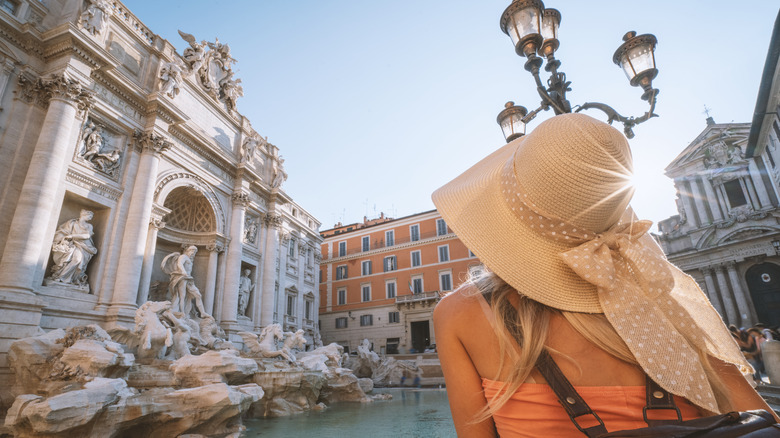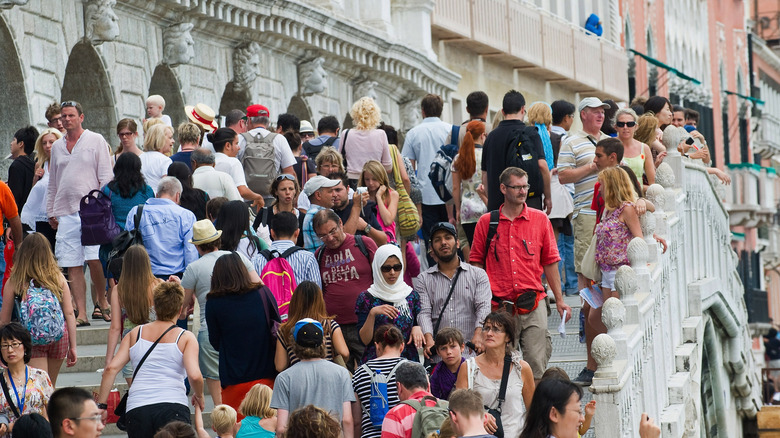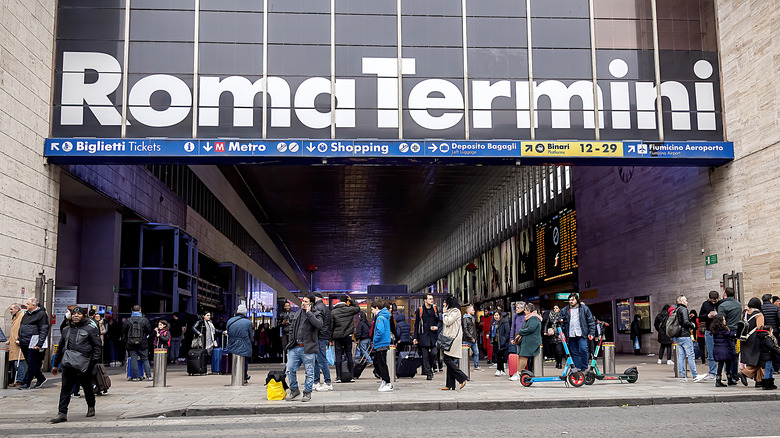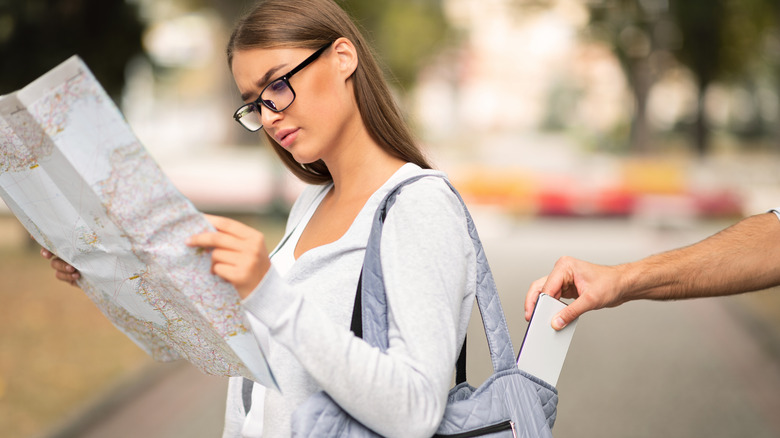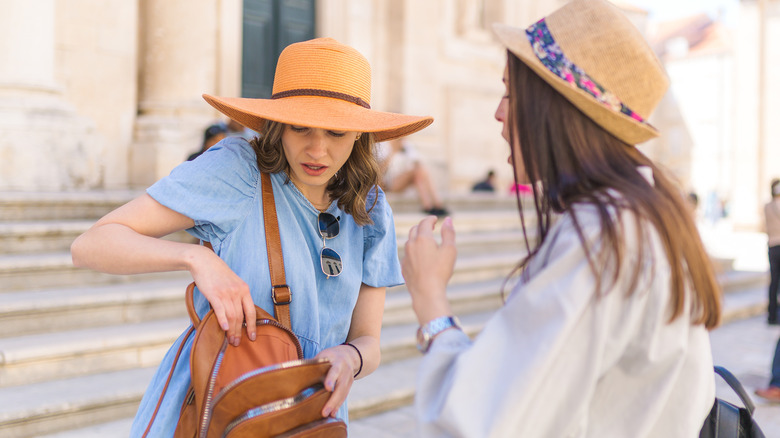Attenzione, Pickpocket! How Concerned You Should Be About Theft In Italy
"Attenzione, Pickpocket!" a woman's voice yells as two young girls shroud their faces and scramble away through the streets of Venice. The voice belongs to Monica Poli, who became popular on TikTok for her videos under the account cittadininondistratti2, which translates to Citizens Not Distracted. In a recent interview with The New York Times, the Venetian woman explained that she has been confronting pickpockets in Venice for 30 years.
While Poli's abrasive approach contributed to the virality of the videos, the very real issue of pickpockets in Italy is something to yell about. If you've ever been pickpocketed while traveling, the incident can leave you feeling violated, mad, and a bit confused about what to do next. It's true that Italy is notorious for its pickpockets, but with a little insight and mindfulness, you can effectively protect your belongings when visiting. While we didn't make any videos, below are a few tips to help you avoid and recognize pickpockets in Italy. Attenzione, informazione!
How common are pickpocket crimes in Italy?
While Italy is a ridiculously beautiful and historic country, pickpocketing is certainly an issue. Any destination that experiences a large influx of tourists will attract petty thieves, and Italy welcomed 74.7 million tourists in 2022. Unfortunately, pickpockets do tend to target tourists, as they're often confused, a bit overwhelmed, and lack situational awareness. Although violent crime in Italy is extremely rare, pickpocketing is not — at least when compared to other European countries.
Quotezone, a travel insurance comparison site, recently created a European Pickpocketing Index. While not too scientific, the data for the index was compiled by comparing the frequency of pickpocketing mentions in UK traveler reviews on TripAdvisor after visiting the top-five tourist attractions of a given country. Scientific or not, Italy topped the list of the European Pickpocketing Index, followed by France and the Netherlands, respectively.
In a bit of good news, reported pickpocketing incidents in Italy actually decreased significantly from 2013-2019, according to Statista. However, due to cell phone distractions, some experts are now warning of an increase in pickpocketing globally, which is something to think about when scrolling at popular tourist destinations.
Pickpocket hotspots in Italy
As mentioned, the data to create the European Pickpocketing Index came from traveler reviews after visiting a country's top-five attractions. In Italy, these places were Rome's Colosseum, Trevi Fountain, and the Pantheon. Meanwhile, Florence's Gallerie Degli Uffizi and Milan's Duomo di Milano in Milan were also named. No matter where you visit, pickpocketing is most prevalent at crowded tourist attractions and major transportation hubs.
Along with these five tourist attractions, the Ponte Vecchio and San Lorenzo Markets in Florence, as well as the area around Florence's Duomo, are hotspots for pickpockets. In Rome, along with the aforementioned attractions, you'll also need to be vigilant around the Spanish Steps and near the Vatican, while the Rialto Bridge in Venice tends to attract pickpockets. Overall, thieves tend to hang out anywhere throngs of tourists gather.
While areas around tourist attractions are susceptible, you need to be extra careful around transportation hubs. The combination of crowds, movement, and tourists carrying their belongings (on person due to transit) has long-made major metro stations a favorite among pickpockets. These hotspots include Roma Termini, Florence's Santa Maria Novella, and Milano Centro. You shouldn't avoid public transportation in Italy due to pickpockets, as there's no way better to travel in the country, but you should stay uber-alert to your surroundings when passing through metro and bus stations.
Common pickpocket tactics to know
Although pickpockets implement an array of tactics to distract their marks, there are a few common techniques among pickpockets in Italy you should learn to recognize. When it comes to transportation hubs, don't accept help with your luggage or belongings. While you may think it's an above-board transaction, similar to car windshield cleaners, it's often just a distraction. Similarly, if a child approaches you begging for money or offering you a trinket of some kind, this is typically a distraction also. Unfortunately, a tug at the heartstrings is often used as a diversion to tug at your belongings.
You may also see groups of juveniles acting obnoxious. As you and others watch the scene, there will be another group looking for "ins" among distracted tourists. And, of course, there's the bump and grab, in which one person or a group will "bump" into you on a crowded street, train, or bus. The sheer physicality of the bump makes it difficult for you to feel a wallet getting lifted.
Overall, you just need to be mindful of distractions. There are plenty of these in Italy, especially in Rome, but when something seems weirdly performative, then it may be a distraction to gauge your (and others') level of susceptibility. Pickpockets can be extremely talented, but muggings in Italy are incredibly rare. Remember, the goal of the pickpocket is to steal without you knowing about it, so your ability to spot their techniques will be an effective defense.
How to protect yourself from pickpockets
While visiting Italy, there are a few deterrents you can implement to avoid theft. For one, try not to look like a tourist. Fortunately or unfortunately, there are no shortages of marks in touristy areas. If you don't look susceptible to theft, there are plenty of others who do.
With this in mind, "dressing up" a bit may help. In Rome, in particular, locals tend to dress nicer than the average tourist. While your Hawaiian shirt and cargo shorts may be comfortable, nice pants and a sharp shirt may be enough to deter most pickpockets. The idea of dressing up applies to women as well, but the type of bag they carry is probably more important. Small purses, crossbody purses, and messenger bags are much more difficult to access than a big purse slung around your shoulder. A general sense of confidence also helps, as pickpockets look for groups of tired, confused, or distracted tourists.
Although you can't completely immunize yourself against theft, you can mitigate it. While exploring, only take what you absolutely need. In other words, carry small amounts of cash and one credit card (or a prepaid card) for larger expenses while storing other cards and cash at your home base. There's just no reason to walk around with wads of cash or (yikes) your passport.
What to do if you're pickpocketed
If you are unfortunately pickpocketed, then immediately cancel any compromised cards and contact your bank. After, you need to report the incident to the police. Whether the authorities are able to do anything about it or not is beside the point. For banking and (hopefully) travel insurance reasons, you'll want full documentation. In Italy, you'll need to ask for a Denuncia di Furto (report of theft) form to keep.
Also, if you quickly realize you've been pickpocketed, then explore the scene of the crime. In many cases, pickpockets only want your cash and your phone. Knowing you'll cancel your credit cards, they'll typically dump these and your other belongings nearby. While still not a great situation, you may recoup your ID, bag, and other items by looking around.
Finally, it's probably not a great idea to "go on the hunt." While getting robbed is understandingly infuriating, it's just not worth kicking up a hornet's nest to retrieve cash, cancelable cards, or a replaceable phone.
